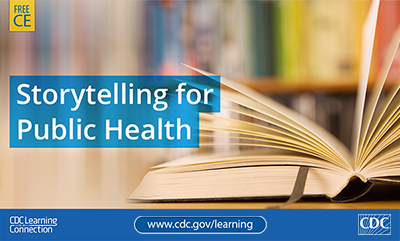CDC Highlights NEPHTC’s Storytelling Course
Re posted from BUSPH News May 1, 2020
Through its ability to draw emotion, connection, and comprehension, storytelling has become an increasingly valuable tool for public health practitioners to use when communicating complex or critical health information to the public—and it is one that the School of Public Health embraces often.
For the month of May, the Centers for Disease Control & Prevention is highlighting a new storytelling course offered by the New England Public Health Training Center (NEPHTC), which is housed in the SPH Activist Lab. The center’s Storytelling for Public Health course is one of three training sessions featured on the homepage of the CDC Learning Connection, an educational platform that offers public health learning opportunities by the CDC, other federal agencies, and federally funded partners. It is the third time the Learning Connection has spotlighted an NEPHTC course.
The free, online storytelling course is a one-hour, self-paced session that introduces the art of telling or writing stories as an effective communication tool in public health practice. All public health professionals can benefit from the training, but it is especially geared towards program managers and communication specialists, as well as community health workers, many of whom are currently on the front lines of the coronavirus pandemic providing critical health services and communicating information within the communities they serve.
“Storytelling has become popular, but it still isn’t an easy thing to do,” says Karla Todd, a training specialist and manager of the NEPHTC. She says organizations typically offer this type of session in a live, in-person setting, so this virtual format makes the course accessible and convenient for participants all over the world.
“Many public health professionals have great stories to tell, but don’t know how, or can’t always get to a live workshop, especially those who are in rural areas,” says Todd. “So we knew there was a need for this course, in a format that is easily digestible, practical, and to the point.”
During the interactive course, participants will learn about the structure and elements of a story, review real-world public health stories in multiple formats, and outline their own story using a storyboard. They’ll be able to craft a compelling narrative that conveys health information in a format tailored to their respective audiences.
“We are excited that the training covers not only how to tell a story, but shows public health examples in different formats, such as writing, video and data,” says Todd.
The training session also satisfies continuing education credits for certified health education specialists and master certified health specialists.
Since it launched in early April, Storytelling for Public Health has also been featured on TRAIN, the largest learning network for public health, as well as in the American Public Health Association’s spring newsletter to community health workers. It reached more than 220,000 subscribers in the CDC Learning Connection’s monthly e-newsletter. Course content was developed by alum Lynn Blevins (SPH’98), a medical epidemiologist and part-time lecturer at The University of Vermont, who has collaborated with the NEPHTC for more than five years. Veena Govada, a front end developer for the Activist Lab, designed the format and technical components of the course.
The New England Public Health Training Center strengthens the public health workforce by delivering a wide range of programs and services, particularly in the region’s medically underserved areas. It also connects students to internship opportunities that focus on improving health equity.
To enroll in the Storytelling for Public Health online course, click here.
